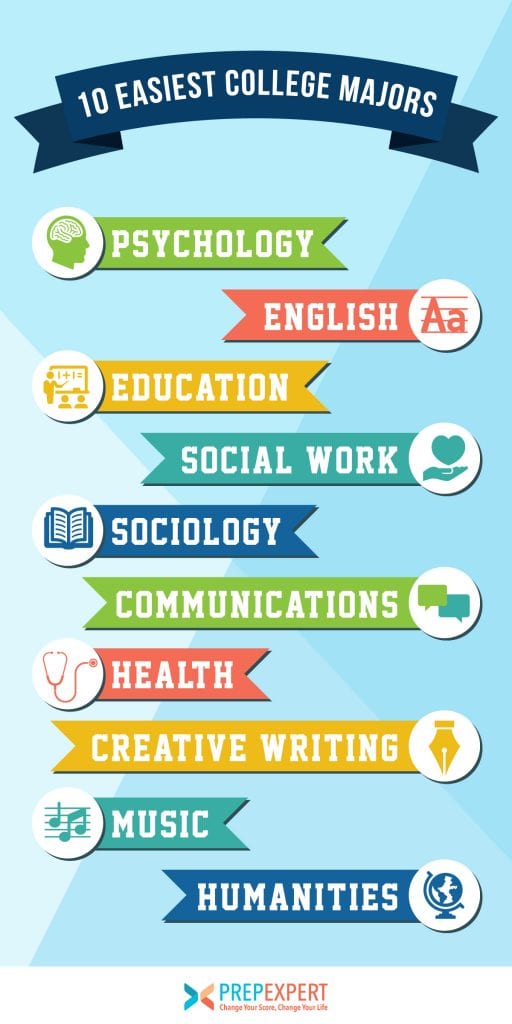10 Easiest College Majors
If you aren’t sure of what to declare for a major, or honestly don’t want to do insanely difficult work but still earn a solid college degree, that’s ok. If anything, consider checking out these academic tracks that are on many people’s “easiest college majors” lists.
Not sure what you want to do in college yet? Looking to put in the work without too much stress? If so, then at least consider these easiest college majors.
Here are some tips on how to successfully pick your college major.
Psychology
Understand how the human psyche works.
Psychology majors learn why individuals behave in certain ways, depending on various motivations and desires. The human mind is your subject matter. Common courses include:
- Statistics
- Analysis
- Interpersonal Communication
Undergraduate psychology majors learn these skills with entry-level ability. If you wish to pursue a graduate degree, then more advanced statistical analysis and theory are taught.
English
If you enjoy reading and text analysis, then consider an English major.
English majors concern themselves with the ability to analyze English texts and lots and lots of reading. Reading can include fiction, as well, as non-fiction sources.
If you’re not a fan of math or science, then English is a fair major to pursue. Moreover, the learned skills apply to various career paths. You have a pick of major jobs, although narrowing your scope down is often difficult.
Education
Learn the skills to become an effective teacher.
An education major’s goal is to prepare you to become a teacher. The benefit here is you have your pick of various specialty tracks:
- Elementary Education
- Secondary Education
- Special Education
In essence, you learn general teaching theory and then drill down into a specialty to earn accreditation. Again, if you don’t like complicated math or science work, then Education is good to choose. It focuses on theory and hands-on application.
Social Work
Make a difference in the lives of people less fortunate in society.
A social work major provides the theory and practical skills for helping people in social need. Social work majors don’t normally need high-level math or science classes to earn their degrees.
Application-wise, social workers work most often in government funded-social programs and institutions. If you want to help those most in need, then social work isn’t a bad option.
Sociology
Sociology majors study behavior directly through data collection.
This field is related to psychology, in that it’s concerned with human behavior. However, sociologists are concerned with collecting and interpreting data about behaviors, instead of investigating motivations.
If you don’t mind math and want to bypass heavy reading or writing work, then sociology is a viable option. Common career paths include human resources, market research, etc.
Communications
A major with a broad skill set applicable to many business fields.
A Communication major is great if you don’t want to deal with any advanced math, science, or heavy writing work. Communications majors are normally set up to tackle a career in media or sales-related roles:
- Journalism
- Marketing
- Public Relations
It all depends on how you want to eventually specialize in your studies.
Health
A great primer for entry into the healthcare industry as a whole.
Majors tend to specialize in one of two tracks:
- Health Administration
- Health Science
As a Health major, you will focus more on theory without digging too deep into lab work or analysis. A Health degree is a great first step towards more advanced health care careers like physical or occupational therapy, for example.
Creative Writing
If you want to pursue writing as a career, this is a proven path.
Creative writing majors spend the bulk of their time sharpening necessary skills:
- Writing Analysis
- Drafting Original Copy
- Providing Peer Feedback and Editing
Successful creative writers can pursue opportunities in media, as well as marketing and advertising.
Music
Open yourself up to performer, production, or music teacher careers.
Music majors have the luxury of various career paths to choose from; the trade-off is long hours of practice and semester performance evaluations.
Music majors again don’t have to worry about complex math or science courses though. The biggest caveat is to be passionate about practice because you will do a lot of it.
Humanities
This major is a good catch-all choice that provides a wide variety of career options.
Humanities majors span a variety of subject matter: History, Philosophy, Religion. If you’re a generalist and don’t know what to specialize in, a humanities degree is a good option.
You will also pick up valuable skills in communication, critical thinking, reading, and writing, that are widely applicable in the workforce.
For more test strategy, college admissions, and scholarship application tips sign up for our FREE class happening right now!
Written by Dr. Shaan Patel MD MBA
Prep Expert Founder & CEO
Shark Tank Winner, Perfect SAT Scorer, Dermatologist, & #1 Bestselling AuthorMore from Dr. Shaan Patel MD MBA

Ivy League Applications: What Sets A Student Apart
Every year, tens of thousands of students apply to Ivy League schools. Only a small fraction receive an offer of…

The Student Loan Rules Just Changed—And Most Families Aren’t Ready
By Dr. Shaan Patel, CEO & Founder of Prep Expert® Student loans have always been complicated. But starting in…

Confidence Is the Hidden Score Booster No One Talks About
Most students think SAT® and ACT® success comes down to knowing more math formulas or grammar rules. That’s only half…
